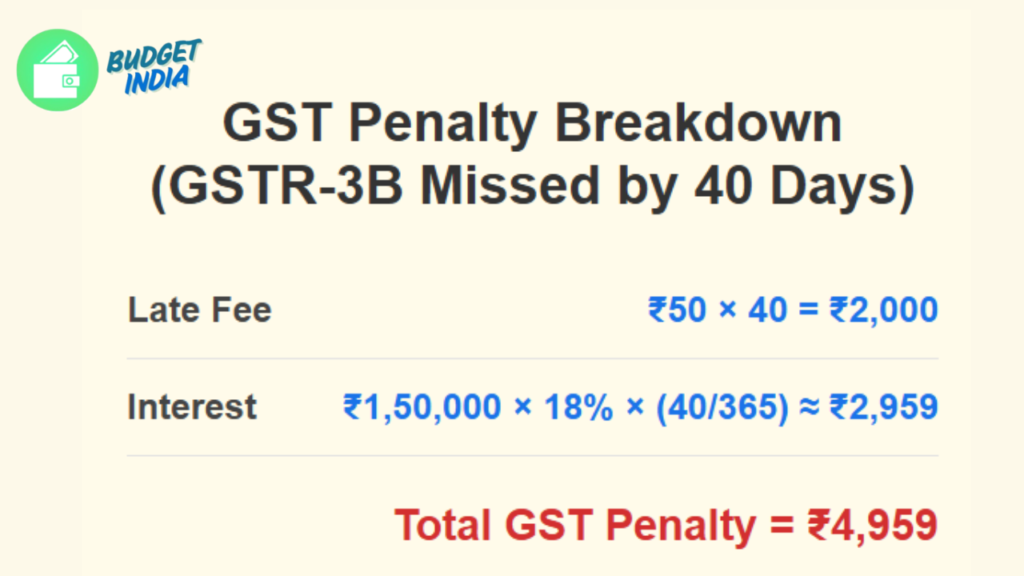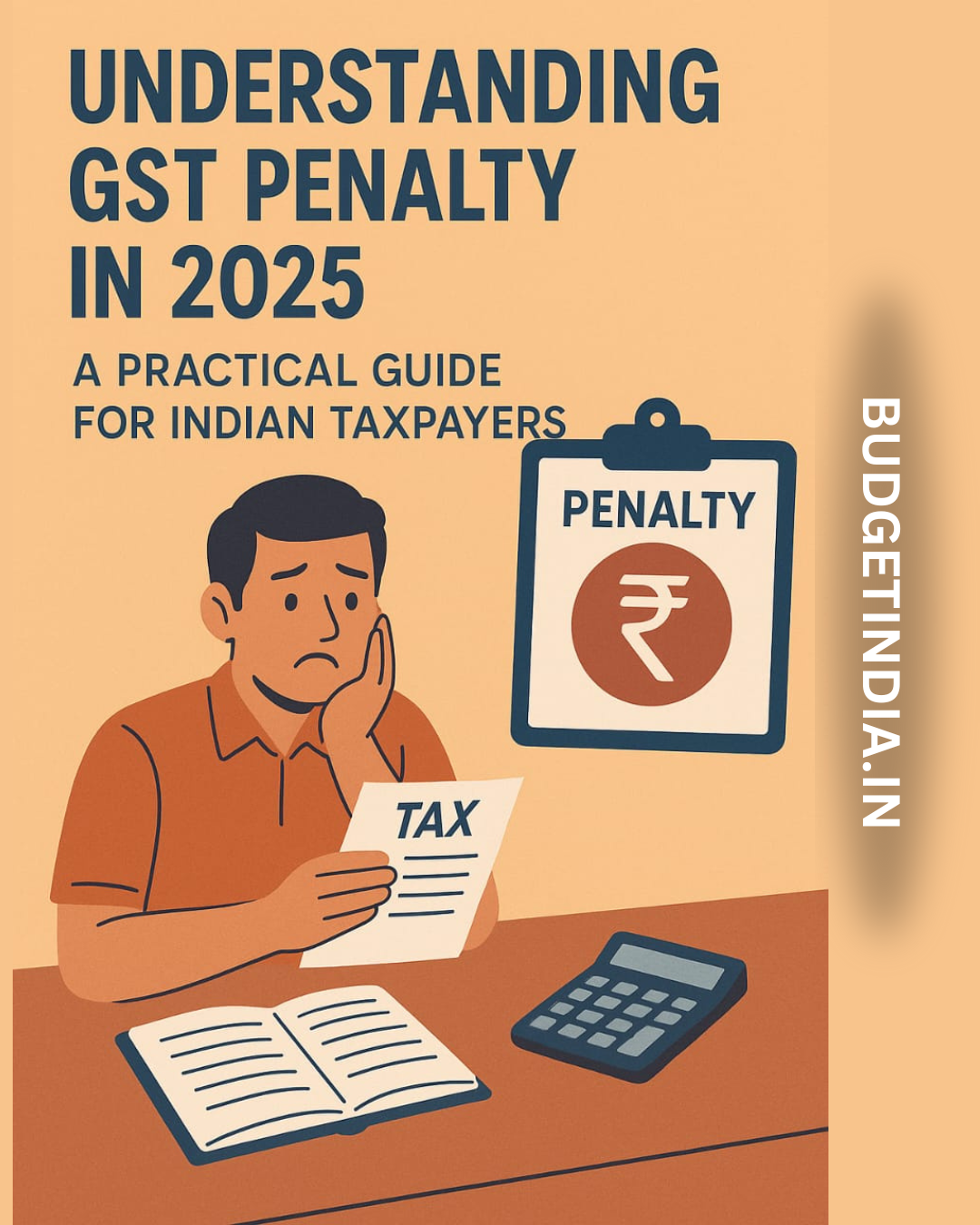GST Penalty isn’t just a line item you brush off—it’s a cost that can snowball into thousands if you’re not careful. In 2025, the penalty for late filing under India’s Goods and Services Tax regime has become a growing concern for businesses, especially MSMEs juggling compliance alongside daily operations. One missed deadline doesn’t just bring a late fee—it invites interest charges, possible registration suspension, and unnecessary scrutiny from tax authorities.
You don’t have to look far to understand why this keeps happening. Maybe the accountant’s on leave. Maybe the cash flow’s tight this month. Maybe you simply forgot. But GST doesn’t leave room for excuses. It operates on automation and deadlines. Once you miss the cutoff, the clock starts ticking—and so does the penalty.
- What Is GST Return Filing and Why It Matters in 2025 (GST Penalty Explained)
- Breakdown of Late Fees in 2025
- Interest Charges on Late GST Payments
- Additional GST Penalties That May Apply
- A Practical Example: How Delays Multiply
- Why Do Businesses End Up Paying GST Penalties?
- How to Avoid GST Penalties in 2025
- Important Filing Dates to Remember
- Frequently Asked Questions (FAQs)
- Final Thoughts: Prevention Is Cheaper Than Penalty
What Is GST Return Filing and Why It Matters in 2025 (GST Penalty Explained)
GST returns are official documents that businesses must submit to the tax department. They detail the sales made, purchases undertaken, tax collected, and the input tax credit claimed. These aren’t optional filings—they’re mandated by law.
Depending on your turnover, you could be required to file monthly (GSTR-3B, GSTR-1), quarterly (under QRMP scheme), or annually (GSTR-9). Late filing invites more than just a GST Penalty—it affects your ability to claim Input Tax Credit (ITC) and may lead to GSTIN suspension if repeated.
Breakdown of Late Fees in 2025
Here’s a detailed look at what you pay when you miss your GST return deadline in 2025:
| Return Type | Late Fee (Per Day) | Maximum Late Fee Limit |
|---|---|---|
| GSTR-1 (Outward supplies) | ₹50/day (₹25 CGST + ₹25 SGST) | ₹2,000 (₹1,000 + ₹1,000) |
| GSTR-3B (Regular) | ₹50/day (₹25 CGST + ₹25 SGST) | ₹2,000 |
| GSTR-3B (NIL return) | ₹20/day (₹10 CGST + ₹10 SGST) | ₹500 (₹250 + ₹250) |
| GSTR-9 (Annual Return) | ₹200/day (₹100 CGST + ₹100 SGST) | 0.25% of turnover (state-wise) |
It doesn’t matter if you’ve made sales or not. Even nil returns carry penalties if filed late.
Interest Charges on Late GST Payments
Besides the late fee, you’re also liable to pay interest on the unpaid GST amount. This isn’t a fixed charge. It accumulates for every day you delay.
- 18% per annum: On tax dues not paid on time.
- 24% per annum: On excess ITC claimed or reduced output tax liability.
Let’s say your GST liability is ₹1,00,000 and you delay payment by 30 days. The interest would be:
₹1,00,000 × 18% × (30/365) = ₹1,479 (approx)
Unlike late fees which have a cap, interest keeps growing with every passing day.
Additional GST Penalties That May Apply
Late filing is just the start. The GST law also provides for further penalties under specific sections:
Section 122: General Penalty
- If a person fails to file returns, furnishes incorrect data, or commits fraud, they may be penalised with:₹10,000 or the tax amount involved—whichever is higher.
Section 122(3): For Others (e.g., Professionals)
- Even if you’re a CA or GST return preparer helping someone else evade or delay, the penalty can be up to ₹25,000.
Suspension or Cancellation of GSTIN
- If you don’t file GSTR-1 or GSTR-3B for six consecutive months (monthly filers) or two consecutive quarters (quarterly filers), your GST registration can be suspended or cancelled altogether.
A Practical Example: How Delays Multiply
Let’s say a trader misses their GSTR-3B deadline for March by 40 days. Here’s the breakdown:
- Late Fee: ₹50/day × 40 = ₹2,000 (capped)
- Interest (Tax due = ₹1,50,000): ₹1,50,000 × 18% × (40/365) ≈ ₹2,959
Total GST Penalty = ₹4,959
Now, imagine this happening for multiple months—it can quickly spiral into tens of thousands.

Why Do Businesses End Up Paying GST Penalties?
The common reasons aren’t surprising:
- Delays in payment cycles
- Miscommunication between accountant and owner
- Over-reliance on manual processes
- Lack of awareness of updated deadlines
- No backup when the CA is unavailable
The solution? Automation, proactive planning, and a better understanding of the system.
How to Avoid GST Penalties in 2025
You don’t need magic—just a solid system. Here’s what that looks like:
- Use GST filing software like ClearTax, Zoho, or Tally Prime.
- Subscribe to compliance alerts—don’t rely on memory.
- File nil returns even if there’s no business—this reduces late fees significantly.
- Set aside GST dues in a separate account to avoid cash crunch near deadlines.
- Reconcile ITC every month—don’t wait for the year-end.
- Use the QRMP scheme if eligible to reduce filing frequency.
Important Filing Dates to Remember
| Return | Frequency | Due Date |
| GSTR-1 | Monthly/Quarterly | 11th of following month |
| GSTR-3B | Monthly/Quarterly | 20th/22nd/24th (State-wise) |
| GSTR-9 | Annually | 31st December (Next FY) |
Set these on your calendar. One slip and the GST penalty kicks in, regardless of your intention.
Frequently Asked Questions (FAQs)
Q1. Can late fees be waived?
Occasionally, yes—via government notifications during extraordinary circumstances (like COVID). But this is rare.
Q2. Do I have to pay GST penalty for NIL returns?
Yes, ₹20/day if delayed. It’s lower than regular returns, but still applicable.
Q3. Can I avoid interest if I pay the tax late but file the return on time?
No. Interest is payable from the due date until the payment is actually made.
Q4. What if I file late but have no GST liability?
You still owe the applicable late fee. Filing nil returns late attracts ₹20/day.
Q5. How long before GST registration is cancelled?
Non-filing for six months (monthly) or two quarters (quarterly) can result in cancellation.
Final Thoughts: Prevention Is Cheaper Than Penalty
In 2025, the message from the GST system is loud and clear: file on time or pay the price. GST Penalties don’t just hurt your books—they affect vendor relationships, credibility, and in worst cases, your ability to do business altogether.
But the good news is, with the right systems and a little discipline, compliance doesn’t have to be a headache. Because staying ahead of deadlines is always cheaper than trying to clean up the mess later.






Leave a Reply